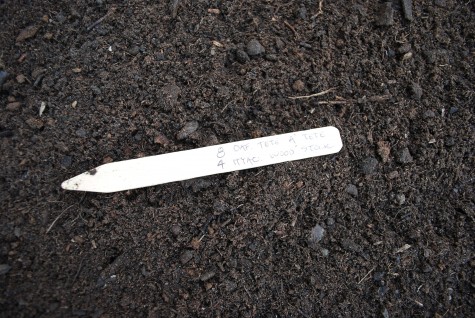
This past November, I planted a slew of spring flowering bulbs in containers. My crumbly compost based soil came from the most mature of Steve’s compost hills. Friable, this soil. I knew my bulbs would be happy. True bulbs are extraordinary, in that they house the leaves and flowers intact, and ready to grow, in an embryonic state. An entire blooming plant exists inside, ready to grow when the conditions are right. Wow. Though I have been curious, I have never had the heart to slice a tulip bulb in half to see what was inside-it always seemed like such a waste of a life. So I believe what I read about this.
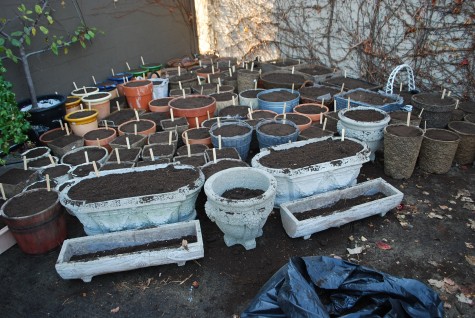
My bulbs were planted in November; they need time to root before the ground freezes hard. Planting them too late can be a problem, should winter arrive unexpectedly early. I have been told that bulbs do not freeze hard through and through when planted in the ground. Should they freeze too hard, they will rot when they thaw. I find this hard to believe, as we routinely have frost that penetrates the ground of a depth of 42 inches, but perhaps a solid freeze is different than deeply penetrating frost. This means container planted bulbs need some winter protection, as their roots are actually above ground. But should they be wintered in too warm a location, they will not get the chilling they need.
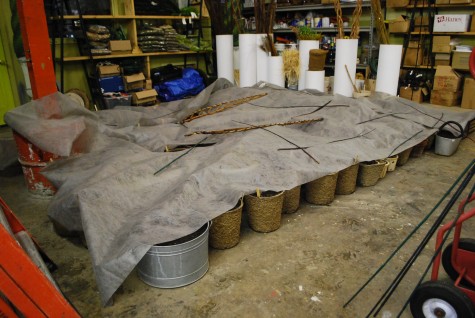 We moved the pots into the garage in late December; I did worry I had left them outside too long. The shop garage is much larger than a car garage, so space was available. We placed them as close to the adjacent heated space as possible, although we only heat that space to 45 degrees in January and February. Bulbs require a period of chilling. Cold temperatures induce a biochemical response that triggers the growth of that embryonic flower. Gardeners in frost free zones have a tough time growing bulbs unless they provide a proper chilling period. A refrigerator dedicated to chilling bulbs-I love that idea.
We moved the pots into the garage in late December; I did worry I had left them outside too long. The shop garage is much larger than a car garage, so space was available. We placed them as close to the adjacent heated space as possible, although we only heat that space to 45 degrees in January and February. Bulbs require a period of chilling. Cold temperatures induce a biochemical response that triggers the growth of that embryonic flower. Gardeners in frost free zones have a tough time growing bulbs unless they provide a proper chilling period. A refrigerator dedicated to chilling bulbs-I love that idea.
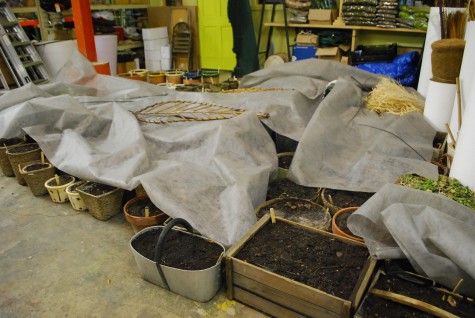 Different bulbs have different requirements for chilling. Tulips need 14-20 weeks. Chionodoxa need 15. Once a bulb has experienced the cold it needs, it can take 2-3 weeks from breaking ground to bloom. My bulbs in containers-I am not forcing them. By this I mean I am not engineering a chilling time that would allow me to have flowers ahead of the normal spring season. I like them to bloom at exactly the same time as they would were they planted in the ground. I just like the idea of bulbs blooming in boxes, or terra cotta pots. I can move them around, or group them on my front porch. I could use a pot of tulips as a centerpiece, or a gift for a friend who is under the weather.
Different bulbs have different requirements for chilling. Tulips need 14-20 weeks. Chionodoxa need 15. Once a bulb has experienced the cold it needs, it can take 2-3 weeks from breaking ground to bloom. My bulbs in containers-I am not forcing them. By this I mean I am not engineering a chilling time that would allow me to have flowers ahead of the normal spring season. I like them to bloom at exactly the same time as they would were they planted in the ground. I just like the idea of bulbs blooming in boxes, or terra cotta pots. I can move them around, or group them on my front porch. I could use a pot of tulips as a centerpiece, or a gift for a friend who is under the weather.
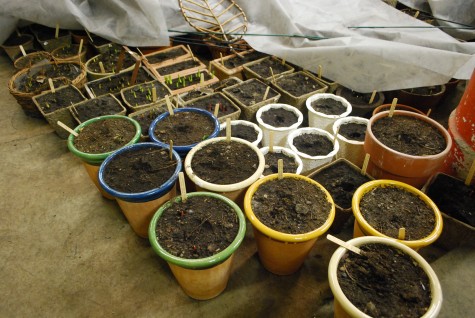 I do not heat my garage space; the extremely cold temperatures we had in February made me worry that the bulbs had frozen too hard. I checked a few pots by knocking the root ball out of some pots-they all seemed well rooted and fine. I cannot account for why this completely unheated space works. Though it is unheated, it probably is not nearly as cold as the out of doors. Perhaps geothermal heat plays a part in keeping the bulb pots just warm enough. No matter the science, I am seeing my bulbs beginning to break ground. You may wonder why I have covered my pots with landscape fabric, as well you should. Our resident cat, MCat, loves nothing better than digging into the dirt, or sharpening his claws on the trunks of old boxwood topairies we store here over the winter.
I do not heat my garage space; the extremely cold temperatures we had in February made me worry that the bulbs had frozen too hard. I checked a few pots by knocking the root ball out of some pots-they all seemed well rooted and fine. I cannot account for why this completely unheated space works. Though it is unheated, it probably is not nearly as cold as the out of doors. Perhaps geothermal heat plays a part in keeping the bulb pots just warm enough. No matter the science, I am seeing my bulbs beginning to break ground. You may wonder why I have covered my pots with landscape fabric, as well you should. Our resident cat, MCat, loves nothing better than digging into the dirt, or sharpening his claws on the trunks of old boxwood topairies we store here over the winter.
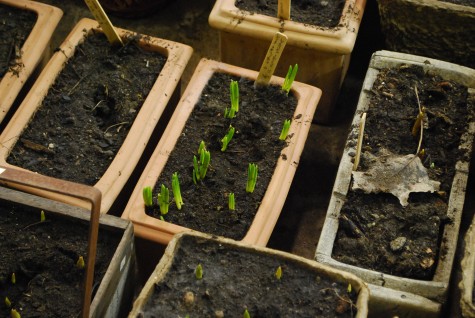 The landscape fabric and some low tech readily available weights keeps him out of these pots. Like countless other people, we accomodate the local wildlife. As you can see, the bulbs are stirring. I know that many plants go dormant in response to a season that cannot support growth. I know that low temperatures slow the chemical activity in plants as a survival strategy. But I cannot decide if these bulbs have been truly dormant. I think there has been a small fire burning here, all winter.
The landscape fabric and some low tech readily available weights keeps him out of these pots. Like countless other people, we accomodate the local wildlife. As you can see, the bulbs are stirring. I know that many plants go dormant in response to a season that cannot support growth. I know that low temperatures slow the chemical activity in plants as a survival strategy. But I cannot decide if these bulbs have been truly dormant. I think there has been a small fire burning here, all winter.
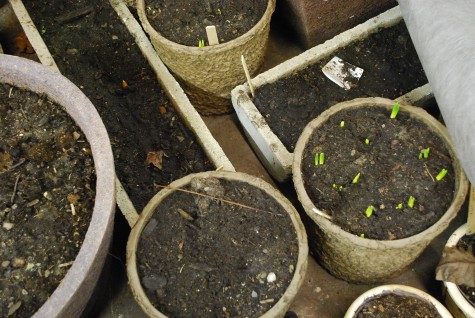
These pictures of pots of dirts with an occasional green or red shoot hardly seem exciting at first glance-you are right about that. But what is happening below the surface, and barely poking through the surface means spring is not far off-I find that incredibly exciting.